

A sailing holiday is a holiday at sea... with a vitamin boost!
In fact, a sailing boat (I'm talking about a sailing boat, but what I've said is also valid for catamarans). Even if the size can feel relatively small, sailing boats hide lots of well-thought and organized spaces, each with its own peculiarities that we will discover during our holiday.
We will (soon) realize that some places are perfect for certain activities, while in others we will enjoy other moments of the day.
The sailing boat is a privileged point of view for a holiday at sea because it allows us to experience the sea... from the sea! This is no small detail...
.
.
A sailboat has a tapered shape. The front part is called the bow, whilst the back part is the stern.
Sailboats of the type we will be referring to here are called cabin boats because they have a living space inside the hull - namely, the cabin. Another aspect that identifies cabin boats is the keel's presence: a heavy ballast that ensures that it cannot tip over under any conditions. A cabin boat is clearly divided into an upper and lower section.
Above and below what? Above and below deck. The deck, otherwise known as the bridge, is the boat's outer surface, the one we walk on when we are outside. If we want to compare this space to your home, above you'll find the living area, and below, you'll have the sleeping area. It is above that we will spend most of our day on holiday, including meals.
The external area is divided into three or four parts: Starting from the stern (we generally enter the boat from the rear, so this is in a sense our front door), we have the cockpit, which is the heart of the boat, this is where we will live most of our day, especially in summer. Bounded at the stern by the little beach and at the bow by the hatch, the opening that allows you to go below deck, the cockpit is a kind of living room of 4/6 square meters.
The cockpit, bordered by benches with soft cushions, features a helm wheel with all the nautical instruments and a superbly equipped table with lights, cup holders, and storage space for drinks and snacks.
You'll also find everything you might need to have at hand while sailing (sunglasses, hats, sun cream). The cockpit is naturally sheltered by the protected position, partially inserted inside the hull. The awning, also known as the bimini, shelters the cockpit from the sun (and rain). The canopy, also known as the sprayhood, shelters it from wind and water splashes. There is a central area in the middle of the boat with two walkways at the sides, mainly occupied by sail rigging but perfect for sunbathing as it is flat and a triangular area in the bow.
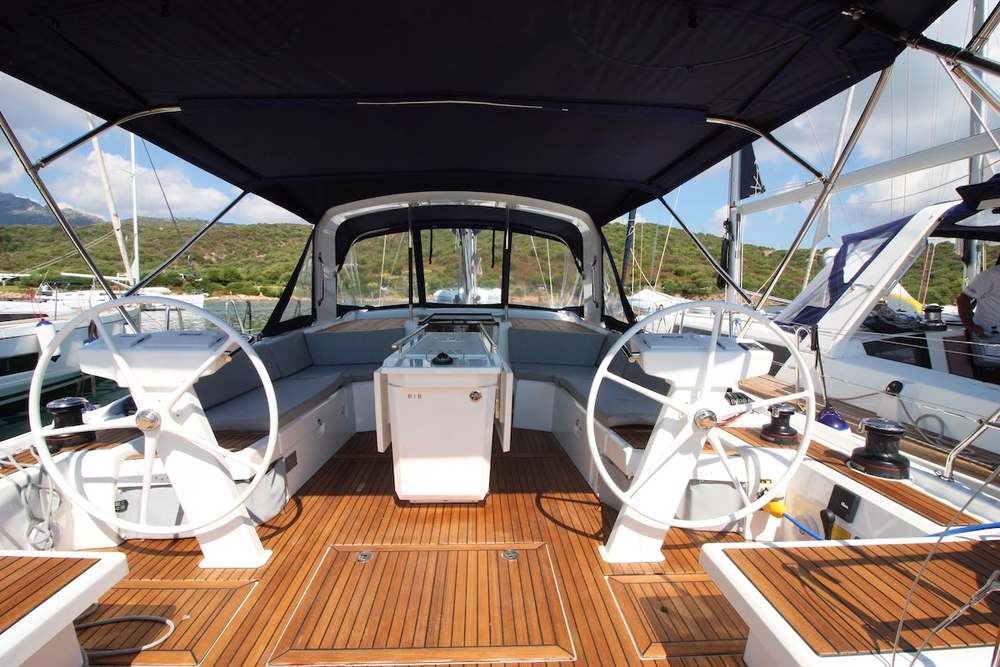
Exterior and the cockpit of a Beneteau Oceanis 46.1
After getting off, we will have the dinette, a sort of multifunctional living area with a small but well-equipped kitchen (two gas burners, two sinks, fresh and seawater at will, an under-sink fridge with a mini freezer).
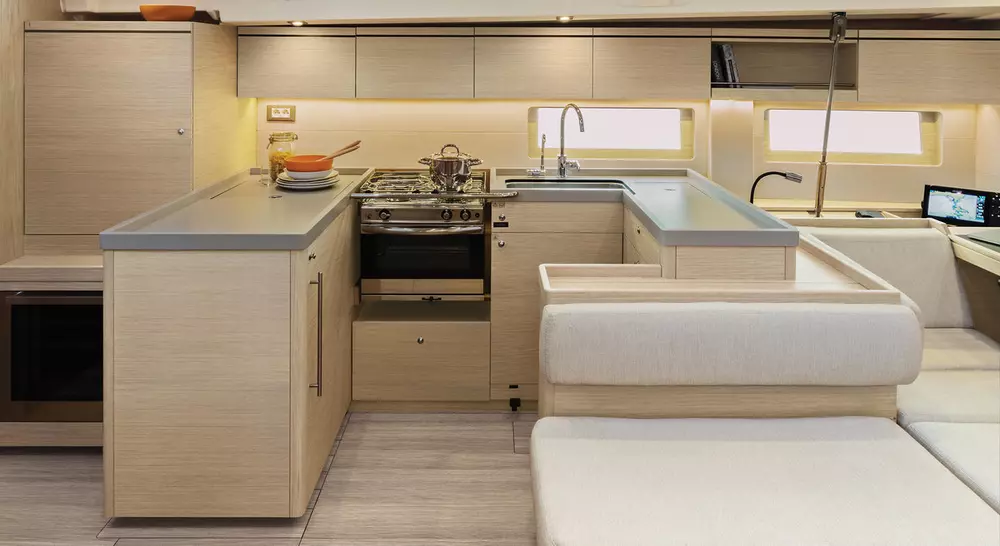
Interior and dinette of a Beneteau Oceanis 51.1
As in every house in every dinette, there is a table and chairs. Often the table is foldable to obtain two additional beds for friends passing through. On modern boats, this area, once the skipper's kingdom, is increasingly becoming the boat's technological heart, from all the monitoring takes place: the position of the boat, the battery charge, the water and fuel level, the switching on of all on-board equipment. For us, it's also where we charge our mobile phones.
This space is overlooked by the cabins and one or more bathrooms, small but very functional, in some cases with a separate shower. A sailboat, as the name implies, is characterised by the presence of sails. Sails are kept in position by the mast, which is made of aluminium. The mast is supported by strong steel cables: the one by the bow is called the forestay (to which the sail is wrapped around to form a soft sausage). The one at the stern, the forestay, often splits to facilitate boarding.
It is also excellent support for not one but two points of support.
On the right and left sides, the mast, which can be more than 15 metres high and is subjected to considerable strain, is supported by shrouds, one or more on each side, which reach right up to the outer side of the boat and are perfect for supporting it as it passes from stern to bow. In this article, I would like to point out two parts of the boat that I am sure you will appreciate to the fullest on your next sailing holiday. The first is the calling card of every holiday sailing boat, the stern platform, which can often be folded down. It is a platform on the surface of the water almost as wide as the boat itself, and its depth varies. Still, it is always enough to get in and out of the water and do all your favourite activities: yoga, diving, a snack, a nice shower or simply enjoy the moment with your feet underwater...
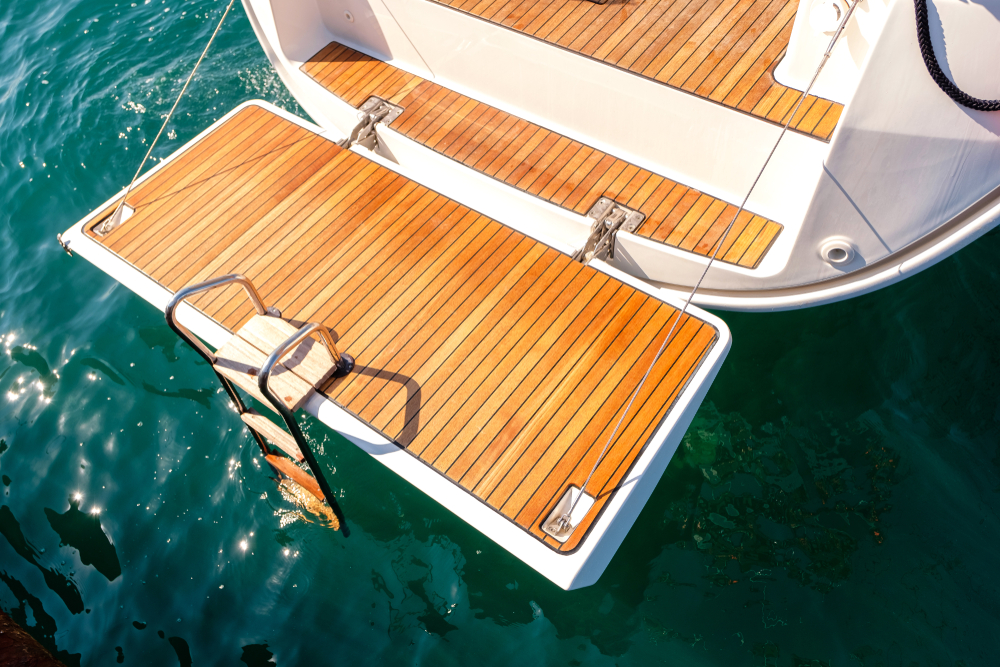
Deck of the sailing yacht from above
This delightful little balcony overlooking the sea also allows easy access on board in all conditions. The second is the bow of the boat itself, where the anchor winch is located. This area is often enhanced by a seat where we can sit back and watch the landscape change, "it's something I really like to do, especially on long motorboats," says Caterina, who has just returned from the Cyclades.
.
.
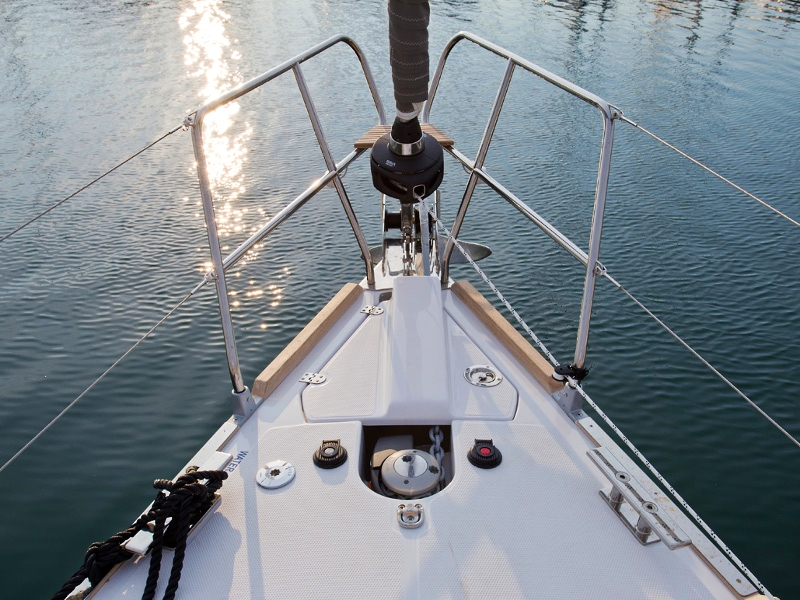
Elan Impression 45
Keep in mind while you're comfortably sitting on the bow and enjoying the scenery, not to end up in the water. You don't need to hold on with your hands. A good way is to put your legs on opposite sides of a candlestick.
A candlestick?!
Our boat is surrounded by a sort of safety railing: Let's see what it looks like: First of all, it is made up of rigid parts consisting of sturdy steel tube railings generally present at the bow and stern (pulpit) and flexible parts consisting of a set of vertical steel tubes firmly fixed to the deck of the boat (the stanchions) joined together by horizontal stainless steel cables (the dragnets).
A fine-meshed safety net can often be attached to these, which is advisable if there are children on board. What about you? What are your favourite parts of the boat?
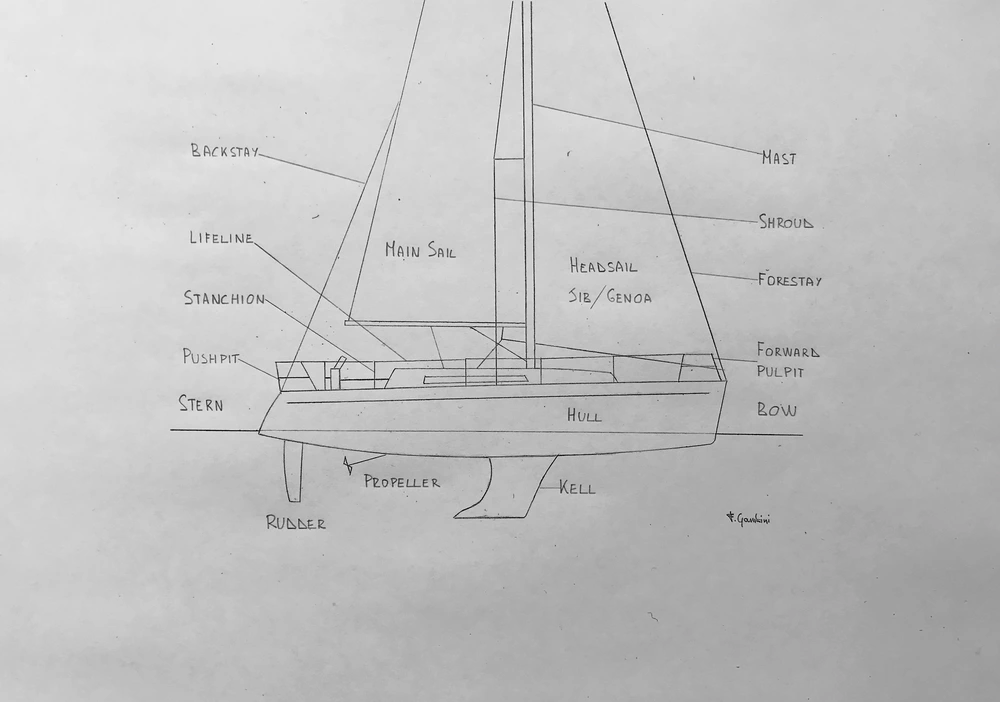

Our regular email newsletters include information about our boats, holiday ideas, destination insights and cultural briefings. You can unsubscribe at any time and we'll treat your data with respect, never passing on your details to third parties. Find full details of our data management in our Privacy policy page
By signing up, I agree to Sailogy's T&C's and Privacy policy

Looking for inspiration for your next sailing holiday? Packed with insights on trending sailing destinations plus stories from expert sailors and first-timers, our brand new digital magazine - Magister Navis - will guide your way to your next sail.
View magazine